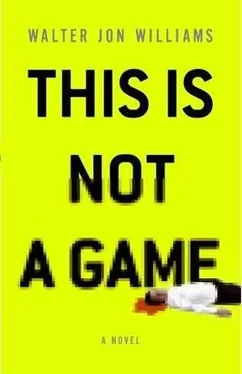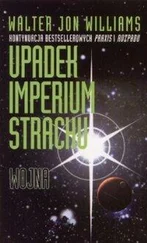“And here’s something else to think about. I’m giving you twice the budget you had for Golden Nagi.”
Dagmar felt her own jaw drop. She looked at the carbonation rising in her glass and put the glass down on the plastic table.
“What are you telling me?” she said.
“I’m telling you,” said Charlie, “that the sky’s the limit on this one. If you tell me you need to send a camera crew off to Planet Nine to take pictures, then I’ll seriously consider it.”
“I-” Dagmar began.
“Consider it a present for doing such a good job these past few years,” Charlie said. She could sense Charlie’s smile on the other end of the phone.
“Think of it,” he said, “as a vacation that never ends.”
Hanseatic says: I was so totally floored when it was revealed that the Rani had really been the Nagi all along.
Hippolyte says: Ye flippin gods! SHE was an IT!
Chatsworth Osborne Jr. says: I was expecting this. The players’ guide turning out to be the villain has been a trope ever since Bard’s Tale II.
Hippolyte says: The Rani isn’t the villain!
Chatsworth Osborne Jr. says: Of course she is. Who put the curse on all those people, I ask you?
“We heard a rumor that the airlines can’t afford to buy jet fuel any longer,” the Dutch woman said the next morning. “Not if they’re paying in rupiah.”
Dagmar considered this. “The foreign airlines should be all right,” she said. “They can pay in hard currency.”
The Dutch woman seemed dubious. “We’ll see,” she said.
The Dutch woman-horse-faced and blue-eyed, like a twenty-first-century Eleanor Roosevelt-was half of an elderly couple from Nijmegen who came to Indonesia every year on vacation and had been due to leave the previous evening on a flight that had been canceled. They and Dagmar were waiting for the office of the hotel concierge to open, the Dutch couple to rebook, and Dagmar to confirm her own tickets. A line of the lost and stranded formed behind them: Japanese, Javanese, Europeans, Americans, Chinese, all hoping to do nothing more than get out of town.
Dagmar had checked news reports that morning and found that the government had frozen all bank accounts to prevent capital flight and had limited the amount of money anyone could withdraw over the course of a single day to something like fifty dollars in American money.
A government spokesman suggested the crash was the fault of Chinese speculators. The governments in other Asian countries were nervous and were bolstering their own currencies.
The concierge arrived twenty minutes late. The shiny brass name tag on his neat blue suit gave his name as Mr. Tong. He looked a youthful forty, and Dagmar could see that the cast of his features was somehow different from that of the majority of people Dagmar had met in Indonesia. She realized he was Chinese.
“I’m very sorry,” Tong said as he keyed open his office. “The manager called a special meeting.”
It took Mr. Tong half an hour to fail to solve the problems of the Dutch couple. Dagmar stepped into the glass-walled office and took a seat. She gave Mr. Tong her tickets and asked if he could confirm her reservations with the airline.
“I’m afraid not.” His English featured broad Australian vowels. “The last word was that the military has seized both airports.”
She hesitated for a moment.
“How can people leave?” she asked.
“I’m afraid they can’t.” He took on a confidential look. “I hear that the generals are trying to prevent the government from fleeing the country. There’s a rumor that the head of the Bank of Indonesia was arrested at the airport with a suitcase full of gold bars.”
“Ferries? Trains?”
“I’ve been through all that with the couple who were here ahead of you. Everything’s closed down.”
And where would I take a train anyway? Dagmar wondered.
Mr. Tong took her name and room number and promised to let her know if anything changed. Dagmar walked to the front desk and told them she’d be staying another night, then tried to work out what to do next.
Have breakfast, she thought.
The dry monsoon had driven out the rain clouds of the previous day, and the sky was a deep, cloudless tropical blue. Dagmar had breakfast on the third-floor terrace and sat beneath a broad umbrella to gaze out at the surrounding office towers and tall hotels, all glowing in the brilliant tropical sun. Other towers were under construction, each silhouette topped by a crane. A swimming pool sat in blue splendor just beyond the terrace. It was about as perfect as a day in the tropics could be.
Her fruit platter arrived, brought by a very starched and correct waiter, and Dagmar immersed herself in the wonder of it. She recognized lychee and jackfruit, but everything else was new. The thing that looked like an orange tasted unlike any orange she’d ever had. Everything else was wonderful and fresh and splendid. The croissant that accompanied the platter-a perfectly acceptable croissant in any other circumstances-was bland and stale by comparison. The meal was almost enough to make Dagmar forget she was stuck in a foreign city that she’d never intended to visit and that had just fallen into economic ruin as surely as if all the great, glittering buildings around her had crumbled into dust.
What happened to you, she wondered as she looked up at the steel-and-glass buildings around her, when your money was suddenly worthless? How could you buy food, or fuel for your car? How could anyone pay you for your labor?
No wonder her taxi driver had been so happy to get American money. With dollars he could feed his family.
On her journey she had taken two hundred dollars with her in cash, for use in emergencies. With that money, she realized, she was better off than all but a handful of the twenty-five million people living in Jakarta.
After finishing her coffee, she decided that since she was stuck in Jakarta, she might as well enjoy the place as much as she could. She returned to her room to change clothes. She put on a cotton skirt and a long-sleeved silk shirt she’d brought with her from the States, an outfit she hoped would be suitable for a Muslim country.
She considered buying clothes here, but all she had was the $180. The dollars, she thought, she should definitely save for emergencies.
She left a hundred of the dollars tucked into her luggage and put the rest, along with her remaining Indian rupees, in a fanny pack. Then she put a hat on her head-a panama, with a black ribbon, that had been woven by machine of some new plastic version of straw. She could roll it up into a tube and stuff it in her luggage-which you could do with a genuine straw panama as well, but this at one-tenth the price.
It set off her gray hair very nicely. Her hair had started going gray when she was seventeen, and by the time she entered college the last of her dark brown hair had turned. She hadn’t minded much at the time-the look had been eye-catching, especially since her eyebrows had remained dark for an interesting contrast, and when she got tired of it, the gray hair was easy to dye a whole rainbow of colors. Eventually she’d grown fond of the gray and decided not to color it any longer. It was a decision that, now that she’d just passed thirty, she was comfortable with, though she reserved the right to change her mind as her biological age caught up with the age of her hair.
It amused her that some people, in an effort to be kind, called her an ash blond.
A younger version of the previous night’s Sikh doorman let her out of the hotel and offered to summon a cab. She said that she’d walk, and he wished her a good morning.
As she set off down the street, she wondered if there was some kind of Brotherhood of Sikh Doormen that had somehow monopolized jobs in many of the big Asian hotels. Perhaps, she thought, that could be an element in some future game-Sikh doormen in various Asian cities would all be part of some conspiracy, and players would have to try to cadge information from them.
Читать дальше











